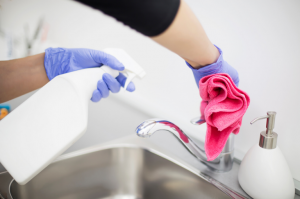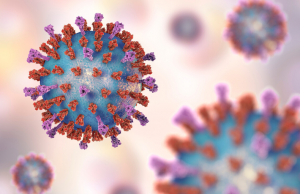There’s no denying that the COVID-19 pandemic threw our world into a tailspin. We hadn’t seen a pandemic this major since the 2009 H1N1 pandemic, which had more than 60 million cases across the globe and over 18,000 deaths. The massive outbreak didn’t end until over a year later.
Despite the turmoil that COVID-19 caused us mentally, emotionally, and financially, there are things we can learn from it. It’s in tough, rocky times that we tend to learn the biggest lessons.
COVID-19 PANDEMIC LESSONS
Despite the havoc and trauma of the coronavirus outbreak, here’s what we can take away from this ordeal.

1. THE IMPORTANCE OF SANITIZING AND DISINFECTING
Ongoing sanitizing and disinfecting have always been essential to preventing infection and reducing the transmission of illness-causing germs.
From homes to businesses and workplaces, proper cleaning and regular disinfecting to effectively kill harmful pathogens is important. An industry best practice is to create and implement a cleaning checklist or schedule to make cleaning more structured and consistent.
The lesson to takeaway is that disinfecting needs to be done when:
- A specific bacteria or virus has been reported (sick employees, customers).
- Bodily fluids come into contact with a surface (blood, feces, urine, vomit, saliva).
- Raw food touches a surface.
- Multiple people share a surface each day (light switches, desks, phones, door handles, coffee makers, gym equipment, grocery carts, etc.).
2. HOW QUICKLY AND EASILY BACTERIA CAN SPREAD
It didn’t take long for coronavirus to travel from its place of origin in Wuhan, China to the rest of the world. On December 31, 2019, Chinese health officials reported 41 mysterious cases of pneumonia to the WHO. By January 20, 2020, the first case of COVID-19 was reported in the United States. On March 11, 2020, the WHO officially categorized the outbreak as a pandemic. By the time April came around, many states were under strict Shelter In Place orders.
Several factors contributed to the rapid spread of this disease:
- Respiratory droplets, which allowed the virus to quickly and easily be transmitted from person to person nearly invisibly.
- Infected people interacting with others or visiting public places and passing the virus to others via coughing, sneezing, talking, and laughing.
- A lack of regular disinfection, and deep cleaning, once the virus had been reported.
- People not taking it seriously.
In general, germs and infections spread in many ways. However, the most prevalent way is through people with existing infections. Some other infections and illnesses that spread easily are the common cold and the seasonal flu.
Watching COVID-19 progress across the globe and through our country, states, neighborhoods and families reminded us just how fast germs can travel, spread, and infect others.
The lesson to takeaway is that bacteria spreads very quickly and easily.
It doesn’t take long for germs to multiply and travel to many surfaces and environments, and ultimately, people.

3. THE IMPORTANCE OF MAINTAINING A FULL SUPPLY OF ESSENTIAL AND IMPORTANT SUPPLIES
Disinfectant wipes weren’t the only product that was challenging to find in 2020. Toilet paper and paper towel aisles were empty and purchase restrictions and limits were implemented. There was a global shortage of hand sanitizer, and even coffee filters. Bleach, disinfectant sprays, and virtually any product that claimed to kill germs was nearly impossible to get.
All of this is a stark reminder that we should keep a healthy supply of essential items at all times.
The lesson to takeaway is that you should maintain a stock of essential items at all times in case of an emergency or pandemic.
Note: Buying in bulk can save you money on a per item basis.
4. THE HUGE ROLE HEALTHCARE PERSONNEL AND FIRST RESPONDERS PLAY IN THE WELL BEING AND SAFETY OF OUR SOCIETY
When the COVID-19 pandemic officially became a reality, our nurses, doctors, first responders, and healthcare staff didn’t hesitate to step up to protect and preserve lives. It’s easy to overlook and forget that these individuals play a crucial role in assuring our safety and well-being. Their sacrifices are often taken for granted and their hard work goes unnoticed and unappreciated.
The lesson to takeaway is that while they are technically doing their jobs, healthcare professionals and first responders make sacrifices well beyond what we should expect from them to help maintain the safety and wellbeing of others.

5. HOW VULNERABLE THE ELDERLY AND PEOPLE WITH UNDERLYING HEALTH CONDITIONS CAN BE TO INFECTION AND SICKNESS
Once COVID-19 deaths were confirmed, a concerning pattern began to form. This new virus mostly affected elderly adults, especially those over 80. Nursing homes were among the hardest-hit groups.
The pandemic has reminded us of how susceptible people over the age of 65 and those who have underlying health conditions truly are to infection.
There are simple steps to follow to help keep our most vulnerable safe, and a lot of it comes down to practicing good and consistent cleaning protocols that help prevent the spread of infections that disproportionately impact them.
The lesson to takeaway is that while anyone can catch an infection or become seriously ill, the elderly and those with underlying health issues are generally more at risk than the rest of us.
Therefore it’s our responsibility to do our part to protect them and keep them safe. This includes regular cleaning and disinfecting and practicing good personal hygiene as well as offering additional assistance and support.
6. PROPER HANDWASHING
The World Health Organization promotes handwashing as one of the best forms of protection against coronavirus, yet many people still neglect to properly wash their hands after using the restroom or coming into contact with someone who is sick.
After it was discovered that COVID-19 could be transferred through contaminated or infected hands, the CDC launched a global campaign to spread awareness about the importance of handwashing.
Common handwashing mistakes include not washing hands long enough (20 seconds is the minimum) and not washing in between fingers and under nails to name a few.
The lesson to takeaway is that handwashing is very important for the health of yourself and others! Here are some simple hand washing tips:
- Wash hands for at least 20 seconds with soap and water (sing Happy Birthday twice)
- Use antibacterial soap if it’s available
- Scrub hands thoroughly
- Don’t forget to get under fingernails and in between fingers

A PANDEMIC CAN HAPPEN AGAIN – BACTERIA AND VIRUSES AREN’T GOING AWAY
The truth is that bacteria and viruses are becoming more resilient and even our antibiotics and vaccines can’t always be relied on. We’ll need to carry these disinfecting, hand washing, and disinfecting habits into the future to help keep ourselves, our families, and our businesses safer.
While germs will always find their way into your facility, you can do small things to keep them from causing infection and destruction.
